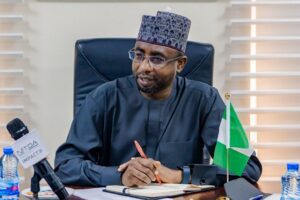National Identity Database crucial to unlock Nigeria’s economic potentials — Danbatta
The Executive Vice Chairman/CEO, Nigerian Communications Commission (NCC), Prof. Umar Danbatta has identified National Identity Database as prerequisite to fully unlock the country’s economy potentials.
Prof. Danbatta made this assertion at a Webinar/Conference organized by the Association of Licensed Telecommunications Operators of Nigeria (ALTON) with a theme: Citizens Identity Management In A Digital Economy – The Role Of Telecommunications Service Providers.
Nigerian NewsDirect reports that the EVC pointed out that the National Digital Economy Policy and Strategy (2020 2030) launched in December 2019, was developed to reposition the Nigerian Economy in order to unlock the many opportunities that digital technologies provide towards the diversification of the Nigerian economy and to transform Nigeria into a leading global digital economy.
“While Mobile devices and adequate digital infrastructure (i.e. broadband deployment etc.) play an important role in the development of any digital economy, there is no gainsaying that the development of a credible national identity database is crucial to the actualization of a robust digital economy,” Danbatta added.
“In more developed nations where robust digital ecosystems already exist, digital identity has been adopted as a tool for transformation of governance and service delivery in areas such as: transportation, financial inclusion, immigration, healthcare, social safety nets, agriculture, security etc.
“According to the McKinsey Global Institute Report of 2019, it is projected that in emerging economies such as Nigeria, digital Identity alone could unlock 50 to 70 percent of the countries full economic potential, assuming adoption rates of about 70 percent.
“The report also projects that Nigeria along with other emerging countries could unlock economic value equivalent to between 3 and 13 percent of GDP by 2030 from the implementation of digital identity programs.
“Indeed a robust Identity Management System with quality data is key for every emerging economy. Nigeria, and by extension Africa, must therefore leverage on its digital identity as a reliable tool for socio economic development and accelerated growth of its digital economy.
“It is on this premise that the Federal Government of Nigeria has prioritized the need to have a single national identity system for all citizens, in order to carry out its mandate in social and economic development, law enforcement, intelligence and political development,” he noted.
The NCC boss said, the National Identity Management Commission (NIMC — the identity regulator) was tasked with the mandate to establish the National Identity Database in Nigeria by enrolling and issuing National Identity Numbers (NIN) to citizens.
He said, since commencement of the NIN enrolment exercise in February 2012, the national identity database has gradually grown to over 63 million citizens as at August, 2021 representing a meagre 29.7% of the Nigerian Population.
This, he said, was accomplished over a period spanning eight (8) years through the rollout of NIMC enrolment centres nationwide, albeit with limited coverage, harmonization of Identity Schemes across different sector agencies and more recently leveraging the different sectors of the economy to drive NIN enrolment; through the adoption of NIN as a requirement for citizens to access essential services such as financial services, driver’s license, International Passport and most recently telecommunications services.
“It is said that for any digital identity framework or ecosystem to succeed, it must be available and accessible to as many individuals as possible. There is therefore a global recognition of the increasing importance of Mobile Telephony as a driver/ enabler for digital identity programmes especially in emerging countries such as ours.
“This is because Mobile Network Operators (MNOs) have the ability to reach the majority of individuals due to their vast networks/ coverage of the landscape.
“In the case of Nigeria, with a subscriber base of approximately 187 million and one of the largest databases holding the digital identity of Nigerians, the telecommunications industry is arguably the most critical stakeholder in the development of a credible national database in the Digital Economy Ecosystem.
“This along with other security considerations informed the decision of the Honourable Minister of Communications and Digital Economy to launch the Revised National Identity Policy for SIM Registration mandating the linkage of all active SIMs to the National Identity Number (N IN) of the respective telecommunications subscribers. By so doing, all eligible persons subscribed to telecoms services will be required to enroll for NIN if they are yet to do so.
“For ease of citizen enrolment and linkage of SIM to NIN, the Honourable Minister of Communication and Digital Economy graciously approved that MNOs be granted NIN enrolment licenses by NIMC which paved the way for MNOs to engage in direct enrolment of subscribers for NIN at their customer service centres.
“This has led to the deployment of over 1,500 NIN enrolment outlets by MNOs, with over 1 million citizens enrolled directly at MNO service centres as at date.
“The NIN Policy for SIM Registration is perhaps the most effective driver of NIN enrolment and the development of a credible digital identity database.
“It may interest us to note that 37% of NIN enrolments recorded during the 8 years since NIN enrolment commenced was accomplished by leveraging the Telecommunications Industry. Since commencement of the NIN policy in the Telecommunications Industry, we have witnessed tremendous growth in NIN enrolment from 40 million in December 2020 to over 63 million as at August 2021 (i.e. 23 million citizens enrolled in the past 9 months).
“Although NIN penetration currently stands at 29.7% of the population, with the deployment of the Android Enrolment solution by NIMC, we expect rapid growth of MNO NIN enrolment centres which will translate to exponential growth in NIN enrolments. This bodes well for the actualization of a robust digital identity database and the growth of the digital economy in Nigeria.
“It is our target to achieve 65% NIN penetration in the coming months in order to unlock the economic potentials of the digital economy.
“We are aware that vast resources have been deployed by MNOs to facilitate the accelerated growth of the national identity database. We must therefore commend you for your collaboration and contributions towards the milestones achieved thus far with regards to NIN enrolment and those that will be achieved going forward.
“The Commission as the Telecoms Regulator will continue to guide and support the Industry by providing the necessary regulatory frameworks to ensure the growth of the Digital Identity and Digital Economy ecosystem,” Prof. Danbatta added.




